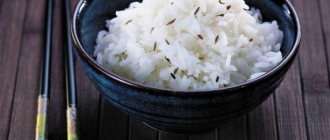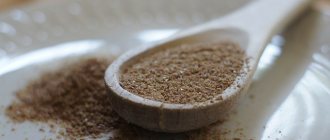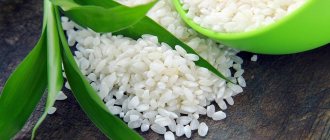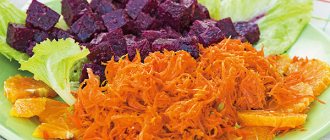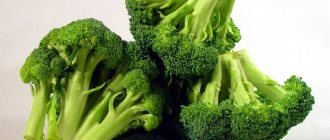Jerusalem artichoke for weight loss. Losing weight with earthen pear
Jerusalem artichoke or earthen pear comes from North America, where the Indians cultivated the plant like we cultivate potatoes. The flowers of this plant are similar to sunflower flowers, and the tubers can be of different colors and at the same time they are irregular in shape.
The earthen pear surpasses many vegetables in iron content; it also contains a lot of potassium, silicon, aluminum, sodium, magnesium, calcium, chromium, zinc, and copper. What else does this root vegetable contain? These are B vitamins, as well as PP, carotene and ascorbic acid, organic acids, pectin, proteins, amino acids, fiber, a natural analogue of insulin, proteins, fatty acids. Thanks to this composition, Jerusalem artichoke strengthens the heart and blood vessels, restores intestinal microflora, normalizes blood sugar levels, neutralizes the harmful effects of antibiotics, and reduces cholesterol levels. The root vegetable reduces blood viscosity and prevents blood clots, protects the liver from pathogenic influences, and relieves inflammation in the gastrointestinal tract.
Jerusalem artichoke helps with:
- dysbacteriosis;
- diabetes mellitus;
- gout;
- anemia;
- urolithiasis;
- salt deposition;
- gastritis;
- hypertension;
- pancreatitis;
- skin diseases;
- cystitis;
- ulcers of the stomach and duodenum;
- heartburn;
- diarrhea;
- enteritis.
This healthy root vegetable stimulates choleretic activity, relieves nausea and vomiting, and helps the body absorb selenium faster (although it does not contain this element). Regular consumption of earthen pear strengthens the immune system and helps the body cope with various viruses and infections that affect the gastrointestinal tract.
Why is Jerusalem artichoke healthier for weight loss? In addition to its low calorie content, this vegetable cleanses the intestines well due to the presence of fiber in its composition. The same substance is responsible for quick and long-term saturation. After eating this root vegetable, you won’t want to eat for a long time. Jerusalem artichoke also regulates appetite, so following various diets will be easier if you include this vegetable in the menu. Earthen pear regulates carbohydrate and fat metabolism. All these properties are great for those who want to become slimmer. Losing weight with Jerusalem artichoke is very satisfying and varied.
What are the benefits of Jerusalem artichoke for weight loss?
The benefits of Jerusalem artichoke for weight loss are much higher than those of other winter vegetables. Its uniqueness is that it does not accumulate harmful substances, for example, salts of heavy metals. On the contrary, it is able to cleanse the liver and the entire body of any type of toxins: alcohol, food, chemicals, radiation. And for those who want to keep fit, Jerusalem artichoke will help quickly satisfy the feeling of hunger, even with a small portion.
Jerusalem artichoke has many properties useful for achieving a slim figure:
- has fiber, which stimulates the gastrointestinal tract, cleanses of waste and toxins;
- reduces the acidity of the gastric environment;
- removes salts from the body;
- is able to bind water molecules, due to which it swells inside the stomach and provides a feeling of fullness for a long time;
- prevents the accumulation of fats in the body;
- stimulates all types of metabolism, including fat and carbohydrate;
- reduces blood pressure;
- protects against exacerbations of pancreatitis, cholecystitis;
- has a positive effect on all organs of the gastrointestinal tract.
Jerusalem artichoke will help you get rid of extra pounds, subject to dietary restrictions. You need to give up baked goods, sweets, and fatty foods. The vegetable will slowly but successfully bring all metabolic processes back to normal, and the extra pounds will go away. The body will not be subjected to severe stress, so after the end of treatment the weight will remain normal.
Weight loss will occur due to the high inulin content. This substance is a polysaccharide, mainly consisting of fructose. It improves the functioning of the gastrointestinal tract, the absorption of food, its processing, and also increases the efficiency of metabolic reactions. Thanks to its sweet taste, Jerusalem artichoke can be used as a sweetener in cocktails, yogurts, and other dishes.
Attention! The rich mineral and vitamin composition of Jerusalem artichoke strengthens the body and replenishes the lack of nutrients when following low-calorie diets. Makes it possible to endure strict dietary restrictions without weakness, fatigue, or bad mood.
Jerusalem artichoke leaves for weight loss. How I eat Jerusalem artichoke and lost 21 kg in 11 weeks
Photo from the Internet
In your dreams of growing old with your husband and dying one day, nursing your great-grandchildren? Fight obesity, don’t be lazy, and then your dream will come true. Not everyone reaches the end, their efforts are negated by torment, deprivation and suffering, but those who reach change their lives qualitatively and forever. Make friends with sports, hoops and a balanced diet, and then the number you need on the scales will appear sooner.
My dear readers, Jerusalem artichoke is a herbaceous plant that I have not noticed on the shelves in the supermarket for a long time. I confused it with ginger roots and even potatoes. Sometimes I caught myself thinking about how far the work of breeders has come, that potato varieties are so bizarre and different. This continued until I saw an unfamiliar name on the label - Jerusalem artichoke. Well, this is certainly not a potato variety, since a postscript would follow - Jerusalem artichoke potatoes.
Benefits and composition
Jerusalem artichoke is a special product native to North America. It’s always amazing that Americans have such opportunities to eat a balanced diet, but they are getting fatter day by day. It contains many vital elements - minerals, vitamins, pectins, amino acids and even carotenes.
I think that Jerusalem artichoke was brought to our country to help people. It is an excellent remedy against anemia, obesity and salt deposits. Eating it in moderation “spurs” the heart to work for a long time and with a surprising absence of problems.
We, those who are LOSSING WEIGHT, need Jerusalem artichoke. It improves carbohydrate and fat metabolism. It is indicated for those who monitor insulin levels in the blood. Don't think that this product is a magic weight loss pill. It helps if you eat it in moderation, without fanaticism. Jerusalem artichoke affects the body of each person in its own way. For some, it does little to reduce fat, but it does relieve the ailments that accompany obesity, in particular problems with blood pressure, heart, cholesterol levels in the blood, etc. Your intestines will work like clockwork with it.
How do I eat Jerusalem artichoke?
This product deserves to be in your daily diet, since it contains only 61 kcal per 100 g. The only thing is that I do not recommend it for people with flatulence. Even in a small dose, it provokes increased gas formation in the intestines. GOING TO WORK IN SUCH A CASE WILL TURN INTO HELL FOR YOU.
To lose weight, as well as to dilute my daily diet, I constantly experiment with food. I made a salad from Jerusalem artichoke for my daughter’s birthday. I bought several small tubers of Jerusalem artichoke from our supermarket, and I had everything else for it at home. I put carrots and ginger in it. I grated all the ingredients, then mixed them in a salad bowl and moved on to the main thing - the dressing. I crushed dill and parsley into it, added salt and pepper. In this case, yogurt was not suitable for dressing. I added a little olive oil and squeezed lemon juice. Thus, in this salad there were three products useful for metabolism in addition to it - lemon juice, ginger, dill.
In my weight loss group on VKontakte there are girls who drink Jerusalem artichoke juice for weight loss. They prepare it from Jerusalem artichoke tubers, grinding them on a grater and squeezing the juice into a glass with a rag. In the morning and evening they drink ¼ glass of this juice before meals. It improves metabolism, of course. But for the first time, I advise you to eat Jerusalem artichoke in a salad, as it has a specific taste. It looks like potatoes, but very, very sweet, as if frozen.
What is Jerusalem artichoke syrup?
Many people have heard about the “earthen pear” - Jerusalem artichoke, but few people use this useful product due to its unpopularity. However, on supermarket shelves you can find bottles labeled “Jerusalem artichoke syrup.” What is the contents of these bottles? What are the benefits of Jerusalem artichoke syrup for the body and how to use it so as not to cause harm?
Externally, the product looks like fresh floral honey: it has an intense amber color and a similar, slightly more liquid consistency. The taste is also similar to honey, but with a faint potato flavor. Sweet, but not cloying. It is made from Jerusalem artichoke tubers by boiling at low temperatures (no more than 60 degrees). Thanks to this, the syrup completely preserves the nutrients inherent in Jerusalem artichoke. There are no artificial additives.
How to cook Jerusalem artichoke recipes. Cooking features
Externally, Jerusalem artichoke resembles ginger or celery root and is used raw in much the same way. Also, its tubers are often compared to a pear, as they have a sweetish taste and a pear-like consistency. When preparing main courses or side dishes, Jerusalem artichoke is often replaced with potatoes. Dried and crushed tubers are used instead of starch or flour, this allows you to make healthy baked goods.
Raw Jerusalem artichoke tastes like a cabbage stalk with nutty notes. Some consider it similar to asparagus and artichoke. Roasted earthen pear resembles frozen potatoes, but has mushroom notes.
Knowing the properties of Jerusalem artichoke, it’s easy to come up with recipes for appetizers and soups made from it by analogy with familiar products. Regardless of whether you invent your own version of a dish made from earthen pears or intend to use a ready-made solution that you found in our selection, knowledge of several features of preparing Jerusalem artichoke will be useful to you.
- The first question that a housewife who wants to cook an earthen pear will have to do with the time of cooking, stewing, and baking Jerusalem artichoke. The answer is simple: Jerusalem artichoke takes the same amount of time to cook as potatoes, or even a little faster.
- The second question that inexperienced cooks often ask is related to the need to heat treat the earthen pear. Is it necessary? Will this reduce the benefits of the vegetable? During heat treatment, most of the beneficial properties of Jerusalem artichoke are preserved, but not all: for example, there will be almost no vitamin C left in it after boiling or baking. You can eat Jerusalem artichoke raw, but in limited quantities, since excessive consumption of raw earthen pear can cause bloating. It is not advisable to offer raw Jerusalem artichoke salads to children under 5 years of age. There are no other contraindications to eating earthen pears without heat treatment.
- The third question that can confuse a novice cook is related to cold processing of the product: is it necessary to peel the Jerusalem artichoke? It is believed that if the tubers are thoroughly washed, there is no need to peel them, especially since this is not the most pleasant task. However, this can only be done if you grew the earthen pear yourself without adding excessive amounts of fertilizer - tuberous sunflower quickly absorbs various substances, including nitrates. If you are not confident in the environmental safety of the product, it is better not to be lazy and clean it.
Jerusalem artichoke diet
If you regularly use Jerusalem artichoke for weight loss, it will quickly restore order to the body, cleanse it and make it healthier. Nutritionists consider earthen pear a unique product due to the presence of inulin, a rich source of energy. It solves all problems of the gastrointestinal tract; there is no need to resort to the help of pharmacies. Nutritionists advise eating 100 g of raw vegetable in the morning on an empty stomach in the form of a salad, cocktail, or drinking freshly squeezed juice. Jerusalem artichoke brings the greatest benefit to the body in its raw form.
There are many different earthen pear dishes that can be consumed throughout the day. Introducing them into your daily menu will help significantly reduce the number of calories you consume.
Attention! Mono-diets on an earthen pear are not recommended, as the body quickly weakens. During the day, the vegetable must be combined with protein foods, for example, lean meat, eggs, fish.
Jerusalem artichoke for the night. Eating Jerusalem artichoke: how many times a day can you eat it?
Jerusalem artichoke is a tasty and healthy tuber root vegetable that resembles the taste of sweet and juicy potatoes; in its raw form it is similar to a cabbage stalk. This root vegetable is not as common in consumption as potatoes, but in terms of beneficial properties it surpasses it and will become a worthy alternative to the beloved potato. How to properly eat Jerusalem artichoke, and how much of it you can eat per day, let's try to figure it out in this article.
Jerusalem artichoke does not accumulate harmful substances, so it is suitable for everyday food. If you suffer from bloating or low acidity, then eat the vegetable no more than twice a week. Jerusalem artichoke can cause gas formation and tends to reduce the acidity of gastric juice.
The norm for adults and for children - what is the difference?
- Jerusalem artichoke is saturated with biologically active substances, so an adult can eat 100-150 grams fresh. Jerusalem artichoke.
- It is not recommended for children under 1 year of age to eat Jerusalem artichoke, because the vegetable can cause gas formation or allergies, which infants already suffer from.
- After a year of life, it is better to give the child baked or boiled Jerusalem artichoke in the form of puree, starting with one teaspoon. It is necessary to introduce complementary foods carefully: carefully monitor the condition of the baby’s skin for rashes, redness or peeling to avoid an allergic reaction.
- In its raw form, Jerusalem artichoke can be consumed by children over 5 years of age. The recommendations are the same as in the case of infants - you need to start with a small amount of vegetable.
Use for food and treatment
It is advisable to add Jerusalem artichoke to food periodically for prevention. With this diet you are not at risk of:
- diabetes;
- heart diseases;
- anemia;
- problems with the gastrointestinal tract.
Jerusalem artichoke is used as a medicine for diabetes mellitus of the first and second types. It contains the substance inulin (an analogue of insulin). The main function of Jerusalem artichoke is to lower blood sugar. Therefore, patients can consume it up to 250 grams. per day.
They are advised to replace potatoes and use root vegetable syrup instead of sugar. For a healthy person, such a dose is not necessary. For other diseases (metabolic disorders, anemia), Jerusalem artichoke is eaten according to the scheme 3 times a day, 50 grams. raw before meals, teas and decoctions are drunk in a course, and then take a break.
Important!
If you eat a product for prevention, then there is no need to follow exact proportions; it is enough to introduce this product into your diet. Thus, the difference in taking Jerusalem artichoke for food and for treatment is in the amount and regimen.
Consumption rate per day
Let's look at the rate of consumption of Jerusalem artichoke tubers and their beneficial derivatives.
Tubers
The norm for consuming raw Jerusalem artichoke for a healthy adult is 100-150 grams.
in a day . When finished, this figure can be increased to 300 g. in a day. The therapeutic dose of tubers is 50 g. 3 times a day, soups, stew with other vegetables.
Syrup
Jerusalem artichoke syrup is recommended as a sweetener instead of sugar in tea and desserts for people with diabetes and those wishing to lose weight. It can be added to taste. Do not exceed the norm of 3 tablespoons per day.
. In order to prepare the drink, the tops must be dried and crushed.
Place 1 tbsp in a thermos containing 500 ml of boiling water. l. crushed leaves and let it brew for 8 hours. It is ideal to brew this tea at night. In the morning it is ready to eat. Drink tea 30 minutes before meals, 100 ml 3 times a day.
Decoctions
Attention!
To treat pancreatitis, cholecystitis, hypertension, as well as rid the body of toxins, it is useful to use a decoction of Jerusalem artichoke. It is prepared from fresh roots or from dried and crushed root vegetables.
Fresh roots are boiled for 15-20 minutes, then cooled and taken before eating. You can drink up to two liters of this decoction per day. The decoction must be taken within a week.
Infusions
Infusions are prepared from dried roots. For one liter of water you need to take three tablespoons of chopped Jerusalem artichoke and pour boiling water. Wrap it up, let it brew, then cool.
Infusions are taken before meals, 1 liter per day. The course of taking the infusion is 7 days.
How to eat while losing weight?
Jerusalem artichoke is useful for weight loss because it improves metabolism, contains only 61 kcal per 100 g, and has a low glycemic index. Promotes quick and long-lasting saturation.
For those losing weight, you can eat Jerusalem artichoke every day for a month, then you need to take a break.
The consumption rate is the same as for a healthy person - in raw form a maximum of 150 g, in finished form - up to 300 g.
Jerusalem artichoke is one of the highest-yielding crops, and this is far from its only advantage
As soon as this vegetable is not called: earthen pear, Volga turnip, Jerusalem artichoke. By the way, it was named pear because of its tuber shape. The official name is tuberous sunflower. The flowers, which have 13 petals, really look like sunflower inflorescences and, by the way, look great in a bouquet. For us, it's just Jerusalem artichoke.
5-nt.ru
The great scientist N.I. Vavilov once said that the future lies with four crops: amaranth, stevia, yacon and Jerusalem artichoke. And it was the latter that researchers paid close attention to. In recent years, work has been in full swing in different countries to introduce Jerusalem artichoke into culture. Technologies and equipment have been developed that make it possible to grow this vegetable and produce from it high-quality feed, healthy food products, food additives, biocorrectors, inulin, fructose, herbal preparations, ethanol and much more.
Previously, only enthusiastic summer residents and amateur gardeners cultivated the earthen pear. However, comprehensive biochemical studies of Jerusalem artichoke tubers and aboveground masses, carried out in the last two decades in many countries around the world, have aroused increased interest in it. Today Jerusalem artichoke is one of the highest-yielding plants. It is grown in almost every European country. From one hectare you can collect up to 80 or more tons of green mass and 40-60 tons of tubers.
Russian Academy of Agricultural Sciences, State Scientific Institution All-Russian Research Institute of Potato Farming named after A.G. Lorkha, the National Academy of Sciences of Belarus, including the Scientific and Practical Center for Potato and Fruit and Vegetable Growing and the Central Botanical Garden, which are part of its structure, worked together in 2012-2015 on the topic “Innovative development of potato and Jerusalem artichoke production, creation of new healthy food products, feed mixtures, energy (fuel) additives.” Moreover, the Central Botanical Garden of the National Academy of Sciences of Belarus has been conducting systematic research related to Jerusalem artichoke since 2007. A certain scientific basis has already been created, which has made it possible to organize scientific support for the cultivation of this crop. Among the 20 varieties there are also promising ones. Some tubers have a smooth (potato-like) surface.
Many types of products made from Jerusalem artichoke are today assessed as import-substituting and export-oriented. According to research by scientists, in terms of the collection of dry matter, protein and nutritional value of feed, 1 hectare of Jerusalem artichoke is equal to 1 hectare of corn and 1 hectare of potatoes combined. At the same time, the cost of producing 1 quintal of feed from earthen pears is 1.5-2 times lower than from corn and fodder beets, and 3 times lower than from potatoes.
garden-en.com
The green mass of Jerusalem artichoke is not inferior in nutritional value to the greens of clover and alfalfa, while being superior to timothy and corn. Tubers are considered to be milk feed. When feeding them to cows, milk yield and quality of milk significantly increase. Ground pear is also a valuable crop in pig farming: the weight gain is greater, the quality of meat products is better.
Using the latest achievements of Russian and Belarusian scientists, combining the scientific potential of the two countries, there is a real opportunity to develop a new production based on Jerusalem artichoke in Belarus. After all, the earthen pear is food, food, medicine, and... fuel.
Yes, Jerusalem artichoke is also a valuable, and renewable, raw material for the development of bioenergy. Traditional food crops - sugar cane, corn, wheat, sugar beets, soybeans, sorghum and others - are used as renewable energy resources for the production of biofuels in many countries. However, in the context of the growing processes of the global food crisis, the use of these crops as energy resources is recognized as unjustified.
The high yield of aboveground biomass of Jerusalem artichoke (according to some experts, it exceeds the annual increase in biomass of broad-leaved forest) has allowed scientists in many countries to recommend it for the production of ethyl alcohol (bioethanol, or motor fuel), biogas and solid boiler biofuel. Participants in the International Conference “Bioenergy Crops of the 21st Century,” held in Russia in 2008, called Jerusalem artichoke a bioenergy crop of the new century.
Jerusalem artichoke is probably the only plant that produces an excellent harvest every year at minimal cost. It is unpretentious to soils, it can be grown even in former quarries and landfills, on sandy and sandy loam soils. The earthen pear is an excellent recultivator of lands taken out of agricultural use and a kind of biological soil protector.
It has been established that after 3-5 years of cultivation of Jerusalem artichoke, fertility is completely restored. And even if the land is clogged with sow thistle, wheatgrass and other perennial or annual weeds, in the same time it completely removes them from the field.
econet.kz
Jerusalem artichoke grows up to 3 meters or more in height, and is not afraid of frost (up to 35 degrees) or drought. It is propagated by tubers or seeds. Planting begins in the spring, when the soil at a depth of 8-10 cm warms up to plus 7-8 degrees. Autumn planting also gives good results - 2-3 weeks before the onset of stable frosts. The distance in the row is 25-30 cm, in the rows - 60-70 cm.
This crop is somewhat similar to potatoes. And in many respects, for example, nutritional value, it is even better than both it and beets. On poor soils, the yield of Jerusalem artichoke is higher. It is not affected by late blight. Even tubers that have turned green in the sun do not accumulate substances harmful to humans; they can be safely eaten.
HELP "NG"
To date, there are more than 500 varieties of Jerusalem artichoke in the world. In Belarus, 3 varieties are zoned: “Nakhodka”, “Dessert”, “Sireniki 1”.
ON A NOTE
From a ton of Jerusalem artichoke leaves and stems you can get 50-83.2 liters of alcohol, and from a ton of tubers - 70-132 liters. The above-ground mass yields 2-4 tons of alcohol per 1 hectare, and tubers - 3-7 tons, which is 1.5-3.7 times higher than the yield of alcohol from the same area of sugar beets, potatoes, corn grain, wheat, barley. At the same time, sown areas are saved significantly (10 times or more), especially in comparison with grain crops.
KEEP IN MIND
Unlike potatoes (if the necessary conditions are not created), Jerusalem artichoke is poorly stored, since it does not have a protective cork layer. Therefore, it is better to leave some of the tubers in the ground and dig them up in the spring, when the soil thaws. It is the spring “harvest” that contains the most healthy sugars. Tubers that have sprouted become tasteless.
Diabetic's friend
While in most European countries Jerusalem artichoke was considered a valuable vegetable crop (the taste of this vegetable resembles a radish or sweetened cabbage stalk), in Russia and Belarus it was used exclusively as a medicine.
They were (and are) used to treat eye and nervous diseases and disorders of the cardiovascular system. Due to the high content of pectins, it accelerates the elimination of toxic and radioactive substances and nitrates from the body. Moreover, it does not accumulate harmful substances, including nitrates. In terms of the content of vitamins B1, B2 and C, earthen pear is superior to potatoes, carrots and beets.
As it turned out, more than a hundred low-calorie, but at the same time very delicious dishes can be prepared from Jerusalem artichoke. It can be used fresh, or boiled, fried, baked, stewed, dried, pickled, salted, fermented, canned, frozen. Juice, kvass, compotes and even wine are made from the tubers. Herbal tea is prepared from leaves and inflorescences. Dried, then fried and ground fruits make a very healthy “coffee” drink.
Jerusalem artichoke powder is a good biological additive for many food products. Research by scientists shows that products containing earthen pears best meet the scientifically based requirements for the diet of a modern person who leads a sedentary lifestyle and is constantly under pressure from environmental and psychological stress.
One of the most important advantages of Jerusalem artichoke is that raw tubers contain a large amount (12-16% or more) of plant inulin, which is indispensable for both the prevention and treatment of diabetes. Therefore, Jerusalem artichoke is recommended for people with high blood sugar and metabolic disorders. In addition, inulin is a good food for the growth and development of bifidobacteria, which prevent the development of pathogenic microflora.
Due to the high content of natural magnesium and potassium compounds, earthen pear is useful for cardiovascular diseases. It replenishes selenium deficiency in the body, according to medical scientists. It has been reliably established that Jerusalem artichoke has a beneficial effect on intestinal motility and restores the microbial flora.
Herbal compositions from Jerusalem artichoke developed by scientists and traditional healers are quite effective for taking medicinal baths. They have a therapeutic and prophylactic effect on the entire body, have a beneficial effect on the immune system, and stimulate metabolism. Baths with a decoction of the leaves, stems and tubers of Jerusalem artichoke are very effective for joint pain, loss of strength, stress, insomnia, prostatitis and prostate adenoma.
Doctors recommend earthen pear to calm the central nervous system, improve vision, and also to prevent cancer and heart attack.
Jerusalem artichoke benefits. Jerusalem artichoke: benefits and harms, application
Jerusalem artichoke, a photo of which can be seen below, is widely used in folk medicine and cooking. It helps to cope with diseases of the cardiovascular system, gastrointestinal tract, and musculoskeletal system. Let's figure out what Jerusalem artichoke is, how to prepare it and use it for medicinal and preventive purposes.
Photo: pixabay.com
Jerusalem artichoke: what is it?
Earthen pear, or Jerusalem artichoke, is a herbaceous plant reaching a height of up to 1.5 meters. Underground tubers appear on its shoots, which are eaten. Based on the variety, they can be of different colors: pink, yellow, purple, white or red.
They have a sweetish taste, reminiscent of turnips. The plant was brought to Russia in the 17th century from America and was named after a tribe of Indians from Brazil - “Jerusalem Topinambo”.
Jerusalem artichoke: benefits and harm
Tubers contain a lot of useful elements for the body, such as iron, sodium, potassium, calcium, amino acids, fats and proteins, fiber, vitamins B and C.
Jerusalem artichoke is rich in inulin, a natural analogue of insulin, so doctors recommend using the plant for patients who suffer from diabetes. A decoction of tubers helps normalize blood sugar levels and blood pressure. The plant will also benefit residents of megacities, as it helps neutralize the harmful effects of environmental influences on the body.
What else is Jerusalem artichoke used for? Treatment of diseases such as:
- pathologies of the cardiovascular system;
- dysbacteriosis, ulcers and poisoning;
- obesity, atherosclerosis, gout;
- frequent stress, sleep problems, headaches;
- rash, eczema;
- osteoporosis, radiculitis, osteochondrosis and arthritis - will not be effective without this plant.
Photo: pixabay.com
The beneficial and negative properties of the plant have not yet been fully studied, so do not eat it without restrictions. Avoid eating Jerusalem artichoke if you have an individual intolerance.
Patients who are prone to flatulence should also limit the use of the plant, since Jerusalem artichoke leads to increased production of gases in the intestines. Use Jerusalem artichoke dishes with caution during pregnancy and breastfeeding.
In order not to provoke negative consequences for the body, follow the daily intake of tubers (up to 150 grams). In the opposite situation, Jerusalem artichoke, recipes for dishes from which are presented below, can cause bloating of the abdominal cavity, constipation or diarrhea and other problems with the gastrointestinal tract.
Jerusalem artichoke: use in folk medicine and cooking
Jerusalem artichoke is most often used in folk medicine and cooking:
Jerusalem artichoke syrup
The product strengthens the immune system, increases mental activity, helps fight stress and normalizes water balance.
Preparation:
- Take 500 grams of tubers.
- Grind them using a meat grinder.
- Squeeze out the juice using gauze.
- Heat it in a saucepan over low heat to 60° Celsius.
- Cool and repeat heating 5 times.
- Add the juice of one lemon.
- Pour into a container with a lid and store in a cool place.
Photo: unsplash.com
Infusion
It will help cope with colds, stomach pathologies and diabetes. The product is prepared as follows:
- Take a tablespoon of tubers and chop them with a knife.
- Pour in 800 ml of hot water.
- Leave to infuse in a dark place for 12 hours.
- After time, strain the infusion and drink 150 ml of liquid three times a day before meals.
Tincture
Prepare a remedy to remove toxins and waste from the body:
- Take half a kilogram of dried leaves of the plant and add 1 liter of medical alcohol or vodka to it.
- Leave in a dark room for 2 weeks.
- Before eating, add a tablespoon of tincture to 150 ml of water. Use the product three times a day.
Juice
A patient suffering from tuberculosis will benefit from the following recipe:
- Squeeze the juice from the tuber.
- Dilute it with clean water in a ratio of 1:2.
- Consume 150 ml of the prepared composition 15 minutes before meals.
Jerusalem artichoke salad
This is the simplest recipe for earthen pear salad. To prepare it you will need the following ingredients:
- Jerusalem artichoke - 250 g;
- garlic - 1 clove;
- sour cream 20% - 2 tbsp. l.;
- table salt - to taste.
Cooking method:
- Before preparing Jerusalem artichoke, peel the root vegetable.
- Grate it.
- Chop the garlic.
- Mix the ingredients, add salt and sour cream.
- Start eating the salad immediately after preparation.
Advantages and disadvantages of losing weight on Jerusalem artichoke
Jerusalem artichoke is an affordable and low-calorie product that is often included in weight loss diets. On sale it can be found not only in its natural form, but also processed industrially. This makes following the diet much easier.
Vegetable syrup can be prepared or purchased ready-made. It has a sweet taste, so it can be used as a sweetener, added to:
- beverages;
- salads;
- porridge;
- ready meals.
Jerusalem artichoke powder also makes dieting much easier. You can purchase it at a chain of health food stores or make it yourself. It is enough to dilute it with a small amount of water and drink it before meals. This remedy will help curb your appetite and reduce the amount of calories consumed by reducing the daily amount of food.
Attention! Instead of potatoes, which are known to be harmful to the figure, you can grow Jerusalem artichoke in your garden plot. It does not need to be planted every year, it is enough to do it once, and besides, the Colorado potato beetle does not eat it.
Jerusalem artichoke burns fat. Jerusalem artichoke syrup
Jerusalem artichoke syrup appears here and there on blogs dedicated to healthy eating. Looking at how the next slender girl pours it over her protein pancakes, we involuntarily begin to believe that “here it is” - a sweet and tasty product that can be eaten by those who also want to lose weight, and in normal quantities, and not one at a time teaspoon 1 time per year. The only trouble is that Jerusalem artichoke syrup is no different from rosehip syrup, sugar extract with green tea and pineapple and carob syrup. It is a source of simple carbohydrates and fits well only into the diets of those who have a fairly high need for energy, as well as individuals who are not burdened with a tendency to be overweight.
But they advertise Jerusalem artichoke syrup very incendiary - they say that healthy oligosaccharides are so useful that they burn fat and allow you to enjoy yourself right in the middle of a strict diet. By the way, no sugars burn anything; they serve us as a source of energy, replenishing our glycogen depots or satisfying the body’s daily needs. The most promising time for Jerusalem artichoke syrup is immediately after training, then it will help you recover. Well, if someone overeats on healthy and wonderful foods, they will still gain weight.
So what, you can’t have Jerusalem artichoke syrup at all? One thing you can notice here is that the degree of strictness of the diet very much depends on the goals of the person sitting. If it's not trimming the last 2-3% of fat into the most aesthetically pleasing shape of your life or preparing for a competition, Jerusalem artichoke syrup has a place in your diet. But not 100 ml for each pancake, but somewhere around a teaspoon a couple of times a week. It is absolutely as safe for a healthy person as honey, fructose, and other natural sugars. And it also increases the appetite of those who are sensitive to fluctuations in sugar levels.
The product contains 65 g of carbohydrates per 100 g, and almost nothing else from macronutrients (there are traces of protein and fat). This gives the body about 260 kcal. Less, of course, than in the situation with rosehip and carob, but also not the dream of a person losing weight on low calories.
How to choose Jerusalem artichoke syrup and store it
Despite the inability of Jerusalem artichoke to accumulate substances of little use from the soil, it is better to choose syrup, the main component of which grew in an ecologically clean region. Before purchasing a product, it is recommended to study the composition on the label: except for the juice of the root vegetable itself, water and lemon juice (natural vegetable and fruit inclusions are also acceptable), no other ingredients should be present. If the composition contains dyes, flavors and GMOs, the product is of low quality or falsified.
In a sealed container, the syrup is stored for one year from the date of manufacture. After opening the container, the product should be kept in the refrigerator. How long depends on the manufacturer and its recommendations on the label.
How to store earthen pear in winter at home
Root crops are dug up at the end of October. Some part can be left in the ground until spring. They tolerate winter frosts well and retain all their beneficial properties. And dig up, if necessary, until germination.
To store a large amount of Jerusalem artichoke, it is dug up directly from the ground, put in boxes and stored until spring in the basement or cellar.
Fresh root vegetables can be stored in the refrigerator for up to one month. To do this, they are cleaned, washed well and sorted into bags and stored in the lower container of the refrigerator.
If you have a rich harvest, then some can be frozen. The tubers are frozen whole; they can be cut into portions or grated. Divide into portion bags and place in the freezer.
Jerusalem artichoke retains all its beneficial properties well and is highly valued in dried form. The roots are cleaned, washed and cut into small slices. Place in a warm place away from sunlight and moisture.
The slices can be dried in the oven at 50 degrees; they will dry in 3-4 hours. But first, they need to be boiled for 5 minutes in lightly salted water. Store dry Jerusalem artichoke in a glass jar at room temperature.
Chemical composition
Thanks to its unique chemical composition, the earthen pear is much healthier than potatoes and even beets.
Jerusalem artichoke contains the following beneficial substances and microelements:
1. The most important component is inulin (very close to insulin), of which Jerusalem artichoke contains quite a lot of 15-22%. Inulin is a natural medicine for the treatment of diabetics, as it can lower blood sugar levels.
Inulin also removes radionuclides and heavy metals, strengthens the immune system, and helps restore the liver.
2. Pectins and fiber help normalize metabolism, improve intestinal motility and blood circulation, and remove waste and toxins.
3. The earthen pear contains a lot of iron, which helps fight anemia and increase the level of hemoglobin in the blood.
4. Microelements important for the body are silicon, calcium, potassium, magnesium, phosphorus, zinc. They strengthen bones and teeth, the nervous and cardiovascular systems, and have wound-healing, antimicrobial and anti-inflammatory effects.
5. The amount of Vitamins B and C in Jerusalem artichoke is 3 times greater than in red beets, potatoes or carrots. This is a unique natural source of ascorbic acid.
Rules for preparation and consumption
Those interested in this miraculous root vegetable are usually looking for an answer to the question - how to cook Jerusalem artichoke for weight loss. The vegetable can be eaten raw as one of the ingredients in dietary salads. It is also used to prepare cream soup or puree, which can be served as a side dish.
Fresh root vegetables are grated on a coarse grater or cut into slices of any size. When fried, it makes a wonderful addition to any side dish. If you steam the vegetable, it can successfully replace mashed potatoes. Boiled Jerusalem artichoke is most often added to soups and casseroles are made from it. In addition, juice is squeezed from the tubers of this root vegetable, which is very effective in treating the intestines. And a healthy intestine, as you know, is the key to rapid weight loss.
If you want to quickly say goodbye to extra pounds, you should replace your last meal with a Jerusalem artichoke cocktail. It must be grated on a coarse grater and juice squeezed from half a large lemon must be added to it. In this case, you will need to have breakfast and lunch exclusively with low-calorie dishes and products. Nutritionists also advise eating a little pre-grated Jerusalem artichoke with 4-5 drops of lemon juice about half an hour before breakfast and lunch.
The given diet can reduce the daily caloric intake of a person losing weight by 500-600 kcal. This is quite enough to start the weight loss process.
Dish recipes
Literally every housewife who has been informed about the benefits of Jerusalem artichoke knows how to prepare it. There are plenty of options: boiling, frying, stuffing, marinating, stewing and baking.
Lentil and Jerusalem artichoke stew
You will need: fresh Jerusalem artichoke tubers (250 grams), one diced onion, a pair of garlic cloves, two cups of drinking water (can be replaced with vegetable broth), one cup of lentils pre-soaked for 3-4 hours (it is better to use red), one bay leaf, 8 fresh mushrooms and half a diced sweet pepper.
Peel the earthen pear tubers, wash them and cut them into small cubes. Then heat a frying pan, pour a little vegetable oil into it and pour in the Jerusalem artichoke cubes. They need to be lightly fried. Then you need to reduce the heat and simmer the earthen pear for 7 minutes, then add the garlic cloves and onion. All together should be simmered until the onion becomes soft and begins to emit an aroma. Then you need to add water, pour in the lentils, throw in the bay leaf and cook all the ingredients over low heat for 25 minutes.
Readiness is determined as follows: the mixture should be quite thick, and the Jerusalem artichoke cubes should be soft. As soon as the vegetables are ready, add the peppers and mushrooms to them and simmer everything together for another 10 minutes, after which the bay leaf can be pulled out. This dish is traditionally served with lean fish or meat.
Jerusalem artichoke cabbage soup
You will need: fresh Jerusalem artichoke tubers (from 2 to 4 tubers - depending on size), one onion, lean fish (300 grams), greens (dill/parsley), nettle, sorrel, (one bunch of each ingredient), and black pepper (peas).
First, disarm the nettle - keep it in boiling water with a small amount of salt for 4-5 minutes. Then cut it into strips. Cut the onion into cubes and lightly fry in vegetable oil. Chop the earthen pear into small slices. Pour boiling water over all of the listed ingredients (except sorrel) and cook until tender, indicated by the softness of the Jerusalem artichoke. Literally 2-3 minutes before it is completely ready, throw the chopped sorrel into the pan. Pour the cabbage soup into portions, putting a small slice of baked or boiled fish in each, and garnish with herbs.
Consequences for the figure
Positive:
- ridding the body of harmful and polluting substances;
- normalization of intestinal microflora;
- saturating the body with energy (useful for sports – to enhance the effect);
- eliminating constipation;
- gentle and gradual weight loss without compromising health.
Negative – flatulence (only if you eat Jerusalem artichoke raw).
Jerusalem artichoke is one of the vegetables that have almost no contraindications. This is very convenient for those who want to lose weight but have health problems. The only option when this root vegetable cannot be consumed is individual intolerance and allergic reactions.






